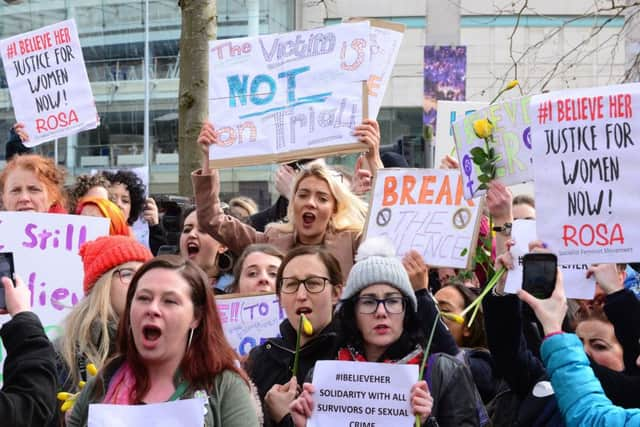Protests over Jackson and Olding verdict will '˜increase tension'


A number of rallies took place across the island of Ireland on Thursday by protestors dissatisfied with the acquittals of Paddy Jackson, Stuart Olding and two other men.
A jury of eight men and three women at Belfast Crown Court returned its unanimous verdict after deliberating for three hours and 45 minutes on Wednesday.
Advertisement
Hide AdAdvertisement
Hide AdMany people have expressed their unhappiness at the verdict as well as the way the case was handled.
This has been most evident on social media, where the hashtag #IBelieveHer has been widely used to show support for the woman at the centre of the high-profile trial.
Thousands took part in a demonstration in Dublin, and large crowds also attended a rally in Belfast outside Laganside Courthouse, where the trial took place.
There have also been protests in towns and cities such as Londonderry, Cork and Limerick.
Advertisement
Hide AdAdvertisement
Hide AdBut North Antrim MP Ian Paisley said people need to “take a step back and respect the court’s decision”.
“The judge has spoken, the jury has spoken and that is the end of this matter,” he told the News Letter.
“These protests will not help in any way and will only serve to increase tensions.”
Mr Paisley accused some people of “latching on” to these demonstrations in a bid to further their own agendas.
Advertisement
Hide AdAdvertisement
Hide AdSupport for the protests has been linked to other equality and social campaigns, such as efforts to repeal abortion laws in the Republic and the #MeToo movement.
Mr Paisley added: “There were some people holding signs calling for support to changes to the Eight Amendment. That has nothing to do with this issue.”
The hugely controversial case saw Jackson, 26, and his Ulster rugby team-mate Olding, 25, cleared of raping the same woman at a house in south Belfast in June 2016.
Not guilty verdicts were also returned for Blane McIlroy, 26, who was accused of exposure, and Rory Harrison, 25, who was accused of perverting the course of justice and withholding information.
Advertisement
Hide AdAdvertisement
Hide AdThe silent rally outside Laganside Courts was organised by Reclaim the Night Belfast, a feminist movement campaigning against gender-based violence and harassment.
In a post on Facebook, the group said it wanted to “create a platform” for anger over the rape trial verdict to be expressed, while also putting forward “important messages”.
It claimed the criminal justice system was “not fit for purpose” when it comes to dealing with sexual crimes.
The group also alleged media reporting of rape trials is “intrusive, salacious and biased towards undermining the victim’s testimony”.
Advertisement
Hide AdAdvertisement
Hide AdCases should not be reported in the press until after the jury has given its verdict, the group claimed.
It also expressed concern that the criminal justice system’s treatment of the victim and media reporting of the trial would “deter victims from coming forward” and reporting in the future.
“The rampant culture of victim blaming and shaming needs addressed,” it added.
Speaking to the News Letter, Nexus NI – a sexual abuse counselling service – said it had experienced “a huge spike” in referrals since Wednesday’s verdict was announced.
Advertisement
Hide AdAdvertisement
Hide AdHelena Bracken from the charity also expressed concerns that the outcome of the high-profile trial would “make women think twice” before reporting sexual crimes to police.
She added: “A very small percentage of our clients decide to go to court, as they know it is going to be an ordeal. One of the many reasons they choose not to go to court is because they feel retraumatised by the whole process.
“A lot of victims feel they are the ones being put on trial and are reliving the abuse all over again.”